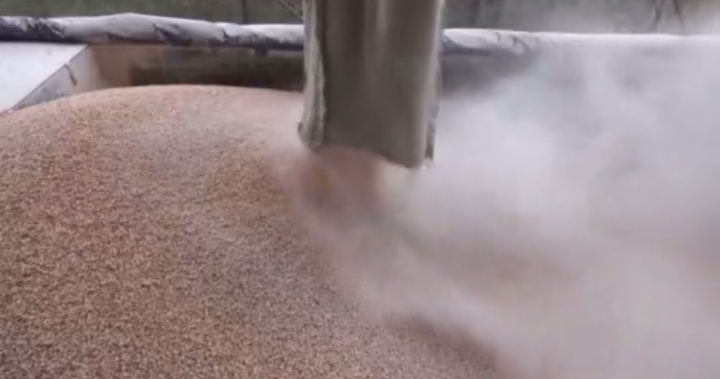Ukraine war will affect food supply, prices | Globalnews.ca
Russia’s war in Ukraine is killing soldiers and civilians. People have been left homeless. Thousands have been forced to move away from where they live.
In cities and towns, residents wonder if they’ll be hit by the next volley of Russian missiles or rockets.
Despite all the uncertainty associated with war, about two-thirds of the nation’s farmers have planted their crops for the year. That’s some good news.
Unfortunately, Ukraine’s grain exports in May were down 64 per cent compared with a year earlier, according to the country’s agriculture minister, as reported by Interfax Ukraine.
Read more:
Ukraine schools closed by war — what’s next?
Ukraine is one of the world’s top grain exporters and the shortfall in exports is significant.
“If you fly in a plane and watch Ukraine … there’s no land not sown … everything is used,” said Kostiantyn Panfilov, who works with Kharviv Agro Development.
At least that’s the picture in normal times, Panifilov explained.
In an interview with Global News, he said it was difficult to know the exact percentage of crops planted in the Kharkiv region because a segment of eastern Ukraine is now under Russian control.
But the consequences of less grain coming from Ukraine is obvious to Canada’s Sylvain Charlebois, director of the Agri-Food Analytics Lab at Dalhousie University in Halifax.
He said that because of the conflict in Ukraine, “the worst is actually ahead of us.”

While Ukraine’s farmers have largely gone ahead with planting this season, there’s a more pressing issue.
“The main challenge is how to sell the grain being produced,” said Olena Vorona, CEO of the Agrotrade Group in Kharkiv.
Most of Ukraine’s exports are shipped from Black Sea ports which are inaccessible, she said.
“It’s a real bottleneck: there’s not enough railway, not enough storage facility,” Vorona said.
It’s estimated there may already be 25 million tonnes of grain that can’t be moved as a result of war, Charlebois said.
So while producers could have an excellent crop this year, despite the war, experts are wondering where it will all be stored until supply lines are cleared up.
The Middle East, Africa and Europe depend on Ukrainian grains and other crops to feed millions.
Read more:
Russia has become ‘a terrorist’ state, says Ukrainian president Zelenskyy
While Canada produces an abundant supply of wheat and other grains, people who buy bread, pasta, and other products should brace themselves for the effects of the war in Ukraine.
“If access is not a problem then food affordability is. The price is going up and Canada is actually not immune. We are seeing prices go up in Canada as well,” Charlebois said.
He said Russia couldn’t have picked a worse time to attack Ukraine if it wanted to disrupt the food supply chain.
“You’re basically weaponizing food when you do that (starting a war), and that’s exactly what’s going on,” he said.
Grain exporters like Agrotrade Group are searching to find other ways to get their exports to market later this summer. But it’s not easy.
Charlebois predicts a “global food security crisis” in the weeks and months ahead even if Ukraine’s producers have a bumper crop.
© 2022 Global News, a division of Corus Entertainment Inc.
For all the latest world News Click Here




